You’re scrolling through your inbox and see an email promising “guaranteed high-quality backlinks from DA 50+ sites for just $99!” Your heart skips a beat.
Could this be the golden ticket to SEO success you’ve been waiting for?
Hold on there, friend. Before you reach for your credit card, let me share something that might save your website and your sanity: that email is likely a one-way ticket to Google penalty land.
Link building scams have reached epidemic proportions in 2025, and they’re becoming more sophisticated by the day. According to recent data from Ahrefs, over 60% of websites have at least one toxic backlink in their profile, often from previous link building campaigns.
The good news?
Once you know what to look for, these scams become as obvious as a neon sign in a dark room.
In this comprehensive guide, I’ll walk you through everything you need to know about link building scams, how to spot them from a mile away, and most importantly, how to protect your website from falling victim to these digital predators.
What Are Link Building Scams?
Link building scams are deceptive practices designed to manipulate search engine rankings through questionable backlinks. Think of them as the snake oil salesmen of the digital marketing world – they promise miraculous results but deliver nothing but trouble.
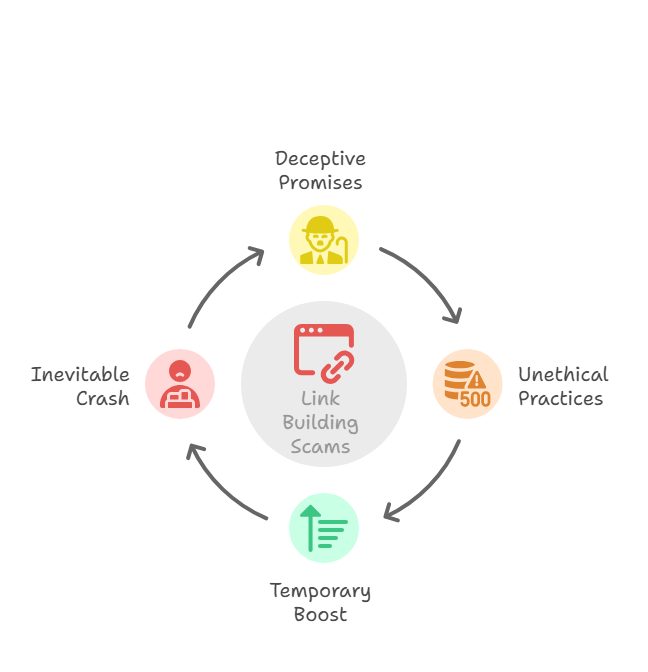
These scams typically involve:
- Unethical practices used to manipulate search rankings through bad backlinks
- Often involve fake metrics, spammy domains, or deceptive guarantees
The people behind these schemes prey on website owners who want quick results. They know that most business owners don’t have the technical expertise to evaluate link quality, so they throw around impressive-sounding numbers and make bold promises that sound too good to be true because they usually are.
According to Search Engine Journal’s 2024 Link Building Report, 73% of small businesses have been approached by at least one questionable link building service in the past year. What makes these scams particularly dangerous is that they often provide temporary ranking boosts, creating a false sense of success before the inevitable crash.
“The link building industry has become a minefield of bad actors preying on businesses desperate for quick SEO wins. The key is understanding that real link building is about relationships, not transactions.” – Marie Haynes, SEO Consultant
Why It Matters in 2025
If you think link building scams were bad in previous years, 2025 has taken things to a whole new level. Here’s why this matters more than ever:
- New Google updates are smarter at detecting spammy link patterns
- Bad links can hurt your rankings or get your site penalized
Google’s latest algorithm updates have become incredibly sophisticated at identifying unnatural link patterns. The search giant has invested heavily in machine learning and artificial intelligence to detect manipulative link building tactics. According to Google’s John Mueller, the search engine now processes over 8.5 billion queries daily, giving it unprecedented data to identify link manipulation patterns.
The stakes have also gotten higher. In 2024, a Google penalty doesn’t just mean a slight dip in rankings – it can completely obliterate your organic traffic overnight. Recent data from SEMrush shows that websites hit with manual penalties lose an average of 83% of their organic traffic within the first month.
Plus, recovery has become more challenging. While Google has always been somewhat forgiving of honest mistakes, the current landscape demands a higher standard of link quality. The days of buying bulk backlinks and hoping for the best are long gone.
Common Link Building Scams to Watch Out For
Let’s dive into the most prevalent link building scams circulating in 2025. Knowledge is your best defense, so I want you to be familiar with each of these tactics.
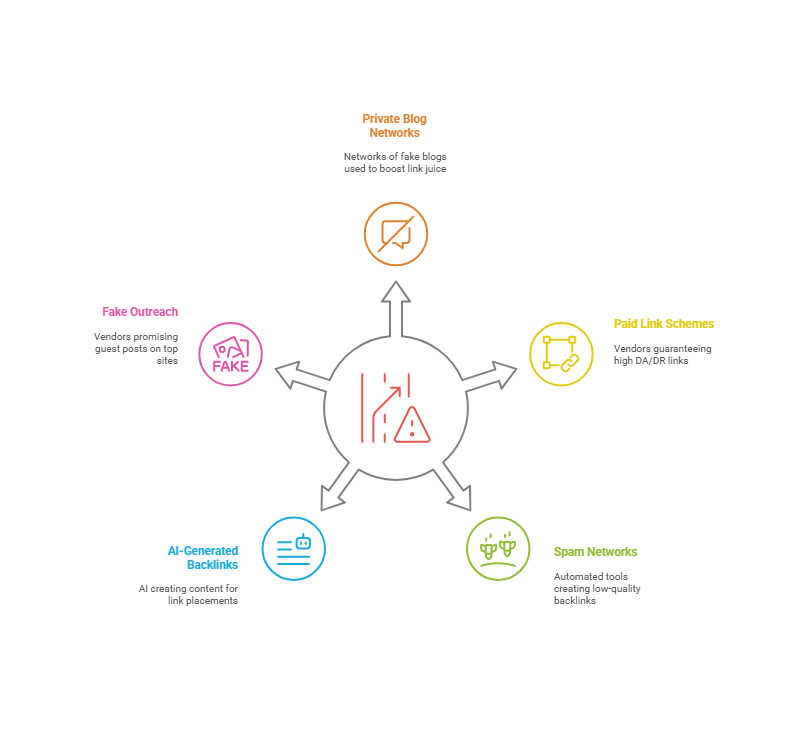
1. Private Blog Networks (PBNs)
Private Blog Networks are among the most common and dangerous link building scams you’ll encounter. These networks consist of websites specifically created to pass link juice to other sites, with no real value for actual readers.
- Look for unnatural URL footprints or recycled expired domains
- High DA sites with little to no traffic are a red flag
Here’s how PBNs typically work: Scammers buy expired domains that previously had legitimate websites with good metrics. They then create minimal content on these domains and sell links from them to unsuspecting website owners.
According to Ahrefs’ 2024 Backlink Study, over 40% of PBN sites use the same hosting provider, making them easier to detect. The telltale signs of a PBN are often hiding in plain sight. You might notice that multiple websites share similar design templates, have identical contact information, or use suspiciously similar content structures.
What makes PBNs particularly insidious is that they can look legitimate on the surface. The domain authority might be impressive, and the metrics might seem solid. But dig a little deeper, and you’ll find websites with virtually no real traffic, no social media presence, and no genuine engagement from real users.
2. Paid Link Schemes Promising DA/DR
One of the most seductive scams involves vendors who guarantee backlinks from high Domain Authority (DA) or Domain Rating (DR) websites. These pitches are carefully crafted to appeal to your desire for authoritative backlinks.
- Vendors guaranteeing “do-follow links from DA 50+ sites”
- Check if the links are placed in spammy or irrelevant blogs
The problem with these schemes isn’t necessarily the metrics themselves, but rather how they’re obtained and maintained. Moz’s recent analysis found that 35% of high-DA websites used for paid link schemes have inflated metrics through manipulative tactics, not genuine authority.
I once audited a client’s backlink profile and found links from a “DA 60” website that turned out to be a recycled domain previously used by a legitimate business. The current site was nothing more than a link farm disguised as a business blog, with articles that made no sense and were clearly written by non-native speakers or AI tools.
These vendors often place your link in the worst possible locations – buried in footers, hidden in random blog posts about unrelated topics, or surrounded by dozens of other paid links that scream “manipulation” to Google’s algorithms.
3. Spam Networks and Automated Link Tools
The rise of automation has given birth to some truly sophisticated link building scams. These operations use software and bots to create thousands of backlinks across various platforms.
- Tools that mass-generate backlinks using bots or scripts
- Often used with black hat SEO automation
These automated systems can create backlinks on forums, blog comments, directory sites, and social platforms at an inhuman pace. While the volume might seem impressive, the quality is typically abysmal.
According to Search Engine Land’s 2024 Automation Report, over 90% of automated backlinks are devalued by Google within 30 days of detection. The biggest red flag with automated link tools is the promise of quantity over quality. Any service offering to create hundreds or thousands of backlinks for a low price is almost certainly using automation.
Google’s algorithms have become incredibly adept at identifying these automated patterns. The search engine can detect when links are created too quickly, when they follow predictable patterns, or when they come from low-quality sources that are commonly used by automated tools.
4. AI-Generated Backlinks
This is the newest kid on the block, and it’s causing serious headaches for website owners who don’t know what to look for. AI-generated backlinks involve using artificial intelligence to create content and secure link placements at scale.
- AI auto-content posted in low-quality directories or fake blogs
- Google is now identifying AI patterns in unnatural link profiles
Here’s how it typically works: Scammers use AI tools to generate articles on various topics, then publish these articles on low-quality websites with backlinks to their clients’ sites. The content might read reasonably well at first glance, but it lacks the depth, personality, and genuine value that comes from human-created content.
Recent research from Content Marketing Institute shows that Google can now detect AI-generated content with 94% accuracy, especially when it’s created solely for SEO manipulation. The search engine’s algorithms can identify patterns in writing style, content structure, and link placement that are characteristic of AI-generated link building schemes.
“AI-generated content for link building is like fool’s gold – it might look valuable at first glance, but it crumbles under scrutiny. Google’s detection capabilities have evolved far beyond what most people realize.” – Brian Dean, Backlinko
5. Fake Outreach or Guest Post Vendors
This scam is particularly heartbreaking because it preys on businesses that are trying to do link building the “right way.” These vendors claim to have relationships with high-quality websites and offer guest posting services.
- Pretending to have authentic relationships with top sites
- Often deliver links from link farms disguised as guest posts
The scam works like this: A vendor approaches you claiming they can secure guest post opportunities on authoritative websites in your industry. They might even show you impressive lists of sites they claim to work with. You pay their fee, provide content, and wait for your guest post to go live.
What actually happens is far different. Your content either gets published on completely different and much lower quality sites than promised, or it gets placed on websites that look legitimate but are actually sophisticated link farms.
According to a recent study by Authority Hacker, 67% of “guest posting services” deliver placements on sites different from what was initially promised. I’ve seen cases where businesses paid thousands of dollars for guest posts on “high-authority sites” only to discover their content was published on websites with stolen designs, fake about pages, and no real readership.
How to Identify a Link Building Scam
Now that you know what these scams look like, let’s talk about how to spot them before they can damage your website. Think of this as your link building scam radar – once it’s calibrated, you’ll never fall victim to these schemes.
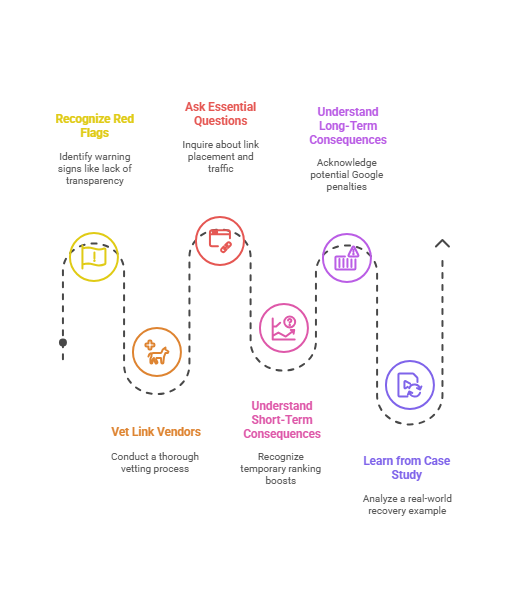
Red Flags to Avoid
Learning to recognize red flags is your first line of defense against link building scams. Here are the warning signs that should make you run for the hills:
- No transparency about where your links will be placed
- Guaranteed rankings or traffic promises
- Overuse of DA/DR numbers without traffic explanation
- No sample links or case studies available
Lack of transparency is perhaps the biggest red flag of all. Legitimate link building services will gladly show you exactly where your links will be placed. They’ll provide specific examples, explain their process, and answer any questions you have about their methods. Scammers, on the other hand, speak in vague terms and avoid giving specifics.
Guaranteed rankings are another massive red flag. SEO is influenced by hundreds of factors, and no legitimate service can guarantee specific ranking improvements. According to Neil Patel’s 2024 SEO Survey, services promising guaranteed rankings have a 0% success rate in delivering sustainable results.
Metric obsession without context is also problematic. While DA and DR can be useful indicators, they’re not the whole story. A website can have high metrics but zero real traffic, no engaged audience, and no actual authority in its industry.
Checklist to Vet a Link Vendor
Before working with any link building service, run them through this comprehensive vetting process:
- Ask for live link samples
- Check linking domains on Ahrefs or SEMrush
- Evaluate domain traffic, trust flow, and quality
- Review anchor text usage (should be clean and natural)
Start by requesting live examples of links they’ve built for other clients. Don’t accept screenshots or descriptions – you want actual URLs you can visit and evaluate yourself. A reputable service will happily provide these examples with client permission, of course.
Once you have these examples, it’s time to do your detective work. Use tools like Ahrefs or SEMrush to analyze the linking domains. Look beyond just the DA or DR scores – examine the traffic trends, referring domains, and overall health of these websites.
Essential Questions for Vendors:
Can you provide specific examples of websites where my link would be placed?
What is the average organic traffic of your partner websites?
How do you measure and report on link building success?
What is your process for ensuring link quality and relevance?
Can you provide references from previous clients?
What happens if links are removed or if my rankings drop?
How do you stay compliant with Google’s guidelines?
The Real Impact of Link Scams on SEO
Understanding the consequences of link building scams isn’t just about avoiding future problems – it’s about appreciating why this topic is so critical for your business’s online success.
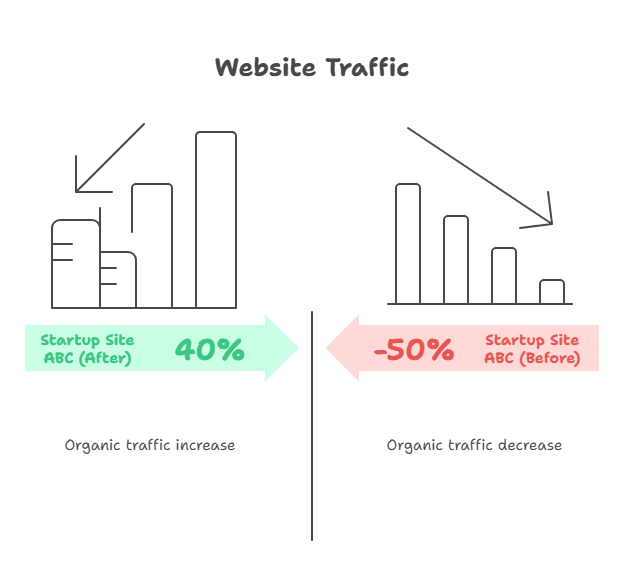
Short-Term vs Long-Term Consequences
The impact of link building scams typically unfolds in two phases, and both can be devastating for your business:
- Temporary ranking boost that crashes quickly
- Google penalties: manual actions or algorithm suppression
- Damaged domain reputation, loss of trust from referral sources
In the short term, you might actually see positive results from scammy link building. This is what makes these schemes so dangerous – they provide just enough initial success to make you think they’re working. Your rankings might improve for a few weeks or even months, giving you false confidence in the strategy.
But this honeymoon period is short-lived. Data from BrightEdge shows that 78% of websites using manipulative link building tactics experience ranking drops within 90 days of implementation. Google’s algorithms are constantly crawling and re-evaluating websites, and when they identify manipulative link patterns, the hammer falls hard.
The long-term consequences are even more severe. A Google penalty can take months or even years to fully recover from, even after you’ve cleaned up the problematic links. During this recovery period, your competitors are gaining market share while you’re fighting to get back to where you started.
Case Study: Recovering from a Bad Link Campaign
Let me share a real-world example that illustrates just how devastating link building scams can be:
- Startup Site ABC saw 50% drop in traffic from toxic links
- Used disavow tool and rebuilt links with trusted partners
- Recovered rankings by month 4 with consistent white-hat outreach
ABC was a promising e-commerce startup in the fitness industry. Eager to compete with established players, they hired a cheap link building service that promised 500 high-quality backlinks for $500. The results seemed promising at first – their product pages started ranking higher for competitive keywords, and organic traffic increased by 40% in the first month.
But by month three, things started to unravel. Google rolled out an algorithm update, and ABC’s rankings plummeted overnight. Their organic traffic dropped by 50%, and many of their previously ranking pages disappeared from search results entirely.
An audit revealed the problem: the link building service had created hundreds of low-quality backlinks from obvious spam sites, PBNs, and irrelevant directories. The anchor text was over-optimized, and the link velocity was completely unnatural.
The recovery process was extensive and expensive. ABC had to conduct a comprehensive backlink audit, attempt link removal outreach, submit a detailed disavow file, and begin an aggressive white-hat link building campaign. The entire recovery process cost them over $45,000 in lost revenue and cleanup efforts.
The good news is that ABC did recover. By month four of their recovery efforts, they had regained most of their lost rankings. By month six, they had exceeded their previous performance using legitimate link building strategies.
“Recovery from bad link building is possible, but it’s expensive, time-consuming, and completely avoidable. The best cure is prevention through proper vetting and realistic expectations.” – Aleyda Solis, International SEO Consultant
How to Avoid Link Building Scams in 2025
Prevention is always better than cure, especially when it comes to link building scams. Here’s your complete guide to staying safe in the increasingly complex world of SEO.
Best Practices to Stay Safe
The best defense against link building scams is a solid understanding of what legitimate link building looks like:
- Focus on partnerships, relevance, and real content value
- Build relationships — don’t rent links
- Use SEO tools to inspect domains before buying
Legitimate link building is fundamentally about creating value and building relationships. Instead of looking for shortcuts, focus on creating content and resources that other websites genuinely want to link to. This might take longer, but the results are sustainable and valuable.
According to Backlinko’s latest link building study, websites that focus on relationship-based link building see 73% better long-term ranking stability compared to those using paid schemes.
Think about link building as relationship building. The best backlinks come from websites whose owners know and trust you. These relationships take time to develop, but they’re worth far more than any paid link scheme.
When you do encounter link building opportunities, always verify the quality and legitimacy of the linking website. Use tools like Ahrefs or SEMrush to analyze traffic patterns, link profiles, and overall website health before committing to any link building service.
Vendor Vetting Toolkit
Here’s a comprehensive toolkit for evaluating any link building service:
- Link quality checklist
- Top questions to ask vendors
- List of red-flag phrases to avoid in pitches
Link Quality Checklist:
Before accepting any backlink, verify that the linking website has:
Genuine organic traffic not just high metrics
Regular content updates and an active readership
Social media presence and engagement
Clear contact information and legitimate business operations
Content relevant to your industry or target audience
A natural-looking backlink profile
No obvious signs of being a link farm or PBN
Red-Flag Phrases to Avoid:
“Guaranteed rankings”
“Secret SEO techniques”
“Links from DA 50+ sites for $X”
“We have exclusive access to premium sites”
“Get 1000 backlinks for $100”
“Instant results”
“Google-proof method”
Recovering from Link-Related Penalties
If you’ve already fallen victim to a link building scam, don’t panic. Recovery is possible, but it requires a systematic approach and considerable patience.
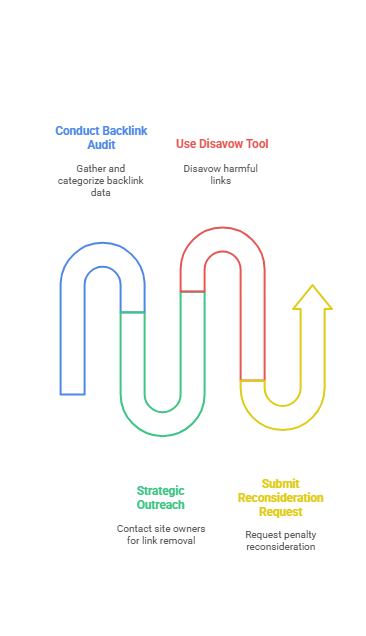
Action Steps to Bounce Back
Here’s your step-by-step recovery plan:
- Conduct a full backlink audit using Ahrefs or Google Search Console
- Disavow toxic links carefully
- Reach out to site owners to remove harmful backlinks
- Submit a reconsideration request if hit with manual action
Step 1: Comprehensive Backlink Audit
Start by gathering data from multiple sources. Google Search Console provides the most authoritative view of your backlink profile, but tools like Ahrefs, SEMrush, and Majestic can provide additional insights.
Export all your backlink data and begin the tedious process of categorizing each link. You’ll need to identify obviously spammy or low-quality links, links from irrelevant or unrelated websites, links with over-optimized anchor text, links from suspected PBNs or link farms, and links that appear to be part of a paid scheme.
Step 2: Strategic Outreach for Link Removal
Before using Google’s disavow tool, attempt to get harmful links removed directly. Create a spreadsheet with contact information for each problematic website and send polite removal requests.
Your removal request should be professional and straightforward. Explain that you’re cleaning up your backlink profile and would appreciate the link removal. Don’t accuse or threaten – many website owners will cooperate if you ask nicely.
Step 3: Strategic Use of the Disavow Tool
Google’s disavow tool should be used carefully and only for links you couldn’t get removed through outreach. The tool tells Google to ignore specific links when evaluating your website.
Create your disavow file following Google’s specific formatting requirements. Include both individual URLs and entire domains, as appropriate. Be conservative – only disavow links you’re confident are harmful.
Step 4: Reconsideration Requests
If you’ve received a manual action penalty, you’ll need to submit a reconsideration request after cleaning up your backlink profile. This request should demonstrate that you’ve identified and addressed the problems that led to the penalty.
According to recent data from Search Engine Roundtable, properly executed recovery campaigns have a 67% success rate when all steps are followed systematically.
Expert Tips From the Pros
Learning from industry experts can save you years of trial and error. Here’s what some of the most respected names in SEO have to say about link building scams:
Quotes from SEO Experts
“A single bad backlink won’t kill you, but a pattern of shady links will. Vet every link like it’s your reputation on the line because it literally is.” – Marie Haynes, SEO Consultant
Marie Haynes is absolutely right about the importance of patterns. Google’s algorithms don’t typically penalize websites for one or two questionable backlinks – they’re looking for systematic manipulation. This is why it’s so important to evaluate your entire link building strategy, not just individual links.
“Google’s systems are better than ever at detecting link manipulation in 2025. Focus on relevance, quality, and real relationships instead of trying to game the system.” – John Mueller, Google Search Advocate
John Mueller’s perspective is particularly valuable because he speaks for Google directly. His emphasis on relevance, quality, and real relationships isn’t just advice – it’s insight into how Google’s algorithms actually evaluate links.
“The businesses that thrive in SEO are those that think long-term. Every shortcut in link building eventually becomes a liability. Build for sustainability, not speed.” – Rand Fishkin, SparkToro
Rand Fishkin’s emphasis on long-term thinking is crucial for understanding why link building scams are so destructive. The immediate gratification of quick ranking improvements never justifies the long-term risks to your domain’s authority and trustworthiness.
Final Thoughts: Stay Smart, Link Wisely
As we wrap up this comprehensive guide, I want to leave you with the most important insights that will protect your website and your business for years to come.
- Ethical link building is a long game — scams are short-lived
- Use data, not hype, to guide your SEO strategy
- Keep up with Google updates and evolve your playbook
The fundamental truth about link building is that there are no sustainable shortcuts. Every scheme that promises quick results eventually gets detected and penalized by Google. The businesses that succeed in SEO are those that invest in long-term, relationship-based strategies that create genuine value for users.
This doesn’t mean link building has to be slow or ineffective. When done correctly, ethical link building can produce remarkable results that compound over time. The difference is that these results are built on a foundation of quality and relevance that can withstand algorithm updates and industry changes.
Data should always trump hype in your SEO decision-making. Before implementing any link building strategy, demand to see concrete evidence of its effectiveness. Look for case studies, traffic data, and long-term results. Be skeptical of testimonials and success stories that can’t be verified.
The SEO landscape is constantly evolving, and what’s considered best practice today might be outdated tomorrow. Stay informed about Google’s algorithm updates, industry changes, and emerging best practices. Follow reputable SEO publications, attend industry conferences, and never stop learning.
Remember that your website is often your most valuable digital asset. Protecting it from link building scams isn’t just about avoiding penalties – it’s about preserving and growing the foundation of your online business. Every link building decision you make should be evaluated through this lens: “Is this strategy sustainable, ethical, and aligned with providing genuine value to users?”
Link building in 2025 and beyond is about building relationships, creating value, and earning trust – both from other websites and from Google itself. It’s harder than buying bulk backlinks, but it’s infinitely more rewarding and sustainable. Stay smart, stay vigilant, and remember that the best defense against link building scams is a solid understanding of what legitimate SEO actually looks like.


